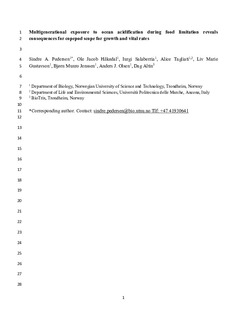| dc.contributor.author | Pedersen, Sindre Andre | |
| dc.contributor.author | Håkedal, Ole Jakob | |
| dc.contributor.author | Salaverria-Zabalegui, Iurgi Imanol | |
| dc.contributor.author | Tagliati, Alice | |
| dc.contributor.author | Gustavson, Liv Marie | |
| dc.contributor.author | Jenssen, Bjørn Munro | |
| dc.contributor.author | Olsen, Anders Johny | |
| dc.contributor.author | Altin, Dag | |
| dc.date.accessioned | 2017-10-18T11:55:02Z | |
| dc.date.available | 2017-10-18T11:55:02Z | |
| dc.date.created | 2015-01-19T12:03:38Z | |
| dc.date.issued | 2014 | |
| dc.identifier.citation | Environmental Science and Technology. 2014, 48 (20), 12275-12284. | nb_NO |
| dc.identifier.issn | 0013-936X | |
| dc.identifier.uri | http://hdl.handle.net/11250/2460821 | |
| dc.description.abstract | The copepod Calanus finmarchicus is a key component of northern Atlantic food webs, linking energy-transfer from phytoplankton to higher trophic levels. We examined the effect of different ocean acidification (OA) scenarios (i.e., ambient, 1080, 2080, and 3080 μatm CO2) over two subsequent generations under limited food availability. Determination of metabolic and feeding rates, and estimations of the scope for growth, suggests that negative effects observed on vital rates (ontogenetic development, somatic growth, fecundity) may be a consequence of energy budget constraints due to higher maintenance costs under high pCO2-environments. A significant delay in development rate among the parental generation animals exposed to 2080 μatm CO2, but not in the following F1 generation under the same conditions, suggests that C. finmarchicus may have adaptive potential to withstand the direct long-term effects of even the more pessimistic future OA scenarios but underlines the importance of transgenerational experiments. The results also indicate that in a more acidic ocean, increased energy expenditure through rising respiration could lower the energy transfer to higher trophic levels and thus hamper the productivity of the northern Atlantic ecosystem. | nb_NO |
| dc.language.iso | eng | nb_NO |
| dc.publisher | American Chemical Society | nb_NO |
| dc.title | Multigenerational exposure to ocean acidification during food limitation reveals consequences for copepod scope for growth and vital rates | nb_NO |
| dc.type | Journal article | nb_NO |
| dc.type | Peer reviewed | nb_NO |
| dc.description.version | acceptedVersion | nb_NO |
| dc.source.pagenumber | 12275-12284 | nb_NO |
| dc.source.volume | 48 | nb_NO |
| dc.source.journal | Environmental Science and Technology | nb_NO |
| dc.source.issue | 20 | nb_NO |
| dc.identifier.doi | 10.1021/es501581j | |
| dc.identifier.cristin | 1200788 | |
| dc.relation.project | Norges forskningsråd: 200806 | nb_NO |
| dc.description.localcode | © 2014. This is the authors’ accepted and refereed manuscript to the article. | nb_NO |
| cristin.unitcode | 194,66,10,0 | |
| cristin.unitname | Institutt for biologi | |
| cristin.ispublished | true | |
| cristin.fulltext | postprint | |
| cristin.qualitycode | 2 | |
